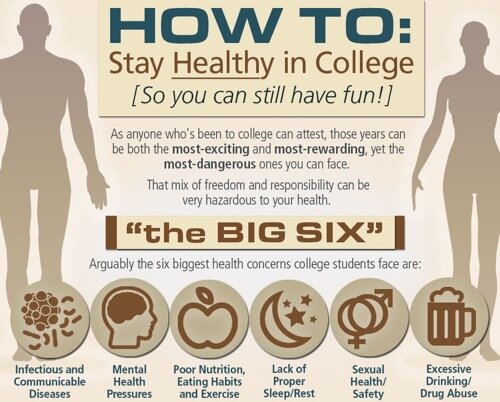As anyone who’s been to college can attest, those years are often simultaneously the most-exciting and most-rewarding yet potentially the most-dangerous ones you can face. All that freedom and opportunity, combined with all that responsibility and pressure, is a dangerous mix that can be very hazardous to your health.
For anyone who’s about to go to college, these hazards can either seem very daunting or just one more thing you quickly want to forget about because it’ll keep you from having fun! Lets face it, with all the myriad of experiences and freedoms available, who wants to be tied down to the “boring” pursuit of health and wellness?
Thankfully, it’s not that hard to create an easy-to-follow plan, thus freeing yourself up to take full advantage of all the fun — and educational opportunities — that college life has to offer.
The Major Concerns
First off, you may be wondering, “What am I supposed to be worried about?” Well, glad you asked. Arguably, the six biggest concerns (in no particular order) are:
1.Infectious and Communicable Diseases
In a Health.com article titled “9 Health Hazards Hidden in College Dorms,” Lisette LeCorgne, a nurse practitioner at the University of Arizona Campus Health Services, stated that, “Living in a dorm room is like living in a petri dish.” Whether on-campus or off, personal hygiene and living-area cleanliness can often be something college students forget about. Combine that with an already over-taxed immune system, and suddenly a host of common diseases start to come into play, including:
- colds and flu
- meningitis
- mono
- strep
- foodborne illnesses
These are amongst the top concerns listed in a recent EverydayHealth.com article titled, “Protect Your Health in College by Taking Smart Precautions.
2.Mental Health
In the most-recent ACHA-NCHA II (American College Health Association – National College Health Assessment II) survey, completed during Spring 2014 and published in Oct 2014, nearly 80,000 (79,266) students across a wide spectrum of U.S. post-secondary schools responded to questions on a range of health topics. The results showed that mental health continues to be a major concern. Specifically, the survey found that at least once in the past 12 months:
- Over 86% (86.4%) of students “felt overwhelmed” by all they had to do.
- Nearly half (46.4%) “felt things were hopeless”.
- Nearly 60% (59.2%) “felt very lonely.”
- Over 30% (32.6%) “felt so depressed that it was difficult to function.”
- Over half (54%) “felt overwhelming anxiety.”
- Over 8% (8.1%) “seriously considered suicide” (with 1.3% actually attempting it).
- Over 6% (6.4%) “intentionally” injured themselves.
- Over half (54.7%) reported that their overall level of stress was “more than average” or “tremendous.”
These are fairly significant percentages, especially for the first item.
3.Poor Nutrition, Eating Habits, and Exercise
Check pretty much any college website for tips on how to stay healthy and you’re likely to find a section discussing eating disorders, poor nutrition and lack of exercise. In fact, it’s almost cliched to say that college students have poor eating habits and don’t get enough exercise — and any number of studies will back that up, including the Spring 2014 ACHA-NCHA II, which reported that:
- Only 36.7% of students ate three or more servings of fruit and vegetables a day; and
- Only 50.4% met the guidelines for the recommended amount of exercise needed.
In regards to eating disorders specifically, the National Eating Disorders Association (NEDA) believes that the time during college is “a period of development in which disordered eating is likely to arise, resurface or worsen for many young men and women.” Further, the NEDA stated that it had launched its recent Collegiate Survey Project (to determine whether greater eating disorder services were needed on college campuses) because it had found that rates of eating disorders had increased in both male and female student populations. In a Feb 2013 press release announcing the results of its survey project, NEDA explained that providing detection, intervention and treatment services is extremely important because “eating disorders are the mental illness with the highest mortality rate.”
4.Lack of Sleep
The always-tired student is another time-honored cliche that is borne out by studies. The Spring 2014 ACHA-NCHA II found that over 60% (61.2%) of students reported feeling “tired, dragged out, or sleepy during the day” for at least three or more of the past seven days.
While lack of sleep seems like a minor issue in comparison to other concerns, when one looks deeper into various studies on the problems caused by lack of sleep, the findings are shocking.
To start, consider the damage that lack of sleep can cause:
- In a 2009 Medical News Today article, Roxanne Prichard, the co-author of a study published in the Journal of Adolescent Health, stated that, “Impairments in the immune and cardiovascular systems are health risks associated with insufficient sleep, as is weight gain.”
- The U.S. Centers for Disease Control and Prevention (CDC), meanwhile, says depression and accidents are also caused by or are associated with insufficient sleep.
- Prichard and fellow researchers found that some students tended to “use alcohol and drugs to regulate their cycles.”
Further, a 2013 CengageBrain.com article cited Daniel Taylor, currently an associate professor of psychology at the University of North Texas, who reported that sleep deprivation in students can result in:
- Missed classes
- Poor academic performance
- Difficulty concentrating
- Hallucinations
- Declines in blood glucose metabolism, blood pressure control and/or insulin sensitivity.
- Mental health issues
An 2012 HuffingtonPost.com article, meanwhile, cited an eye-opening statement from University of Delaware psychologist Brad Wolgast: “When you find depression, even when you find anxiety, when you scratch the surface 80 to 90 percent of the time you find a sleep problem as well.” Maybe even more shocking is the statement that in many instances, students who were worried they had Attention Deficit Hyperactivity Disorder were really just sleep-deprived.
5.Sexual Health/Safety
The CDC reports that, “Nearly half of the 20 million new sexually transmitted diseases (STDs) diagnosed each year are among young people aged 15–24 years.” The previously cited 2011 Health.com article stated that, “As many as 25% of U.S. college students are said to be infected with a sexually transmitted disease.”
That makes the low condom-usage rates found in the Spring 2014 ACHA-NCHA II particularly worrying:
- Only 50.7% of sexually active students mostly or always used a condom or other protective barrier during vaginal intercourse in the previous 30 days; and
- Only 27.2% of sexually active students mostly or always used a condom or other protective barrier during anal intercourse in the previous 30 days.
As for sexual safety/ violence, the numbers can be quite frightening:
- The CDC reports that about 1 in 5 women have been sexually assaulted while in college.
- The Spring 2014 ACHA-NCHA II showed that over 15% (15.3%) of female students reported having experienced a sexual assault, attempted rape, or rape in the past 12 months.
- Male students reported a much-lower, but still eye-opening number: nearly 5% (4.9%).
6.Excessive Drinking/Drug Abuse
Drinking in particular seems an unfortunate rite of passage for students; and while the National College Health Improvement Program reported in its March 2014 white paper that high-risk drinking has remained at a rate of around 40% for the past two decades, levels of extreme drinking have intensified.
In regards to drug use, prescription drugs have become a particular concern. An Educate Before You Medicate fact sheet from the National Council on Patient Information and Education cited a 2009 study that said, “Among people 18 to 22 years of age, full-time college students are twice as likely to use a stimulant for non-medical reasons in the past year compared to those who aren’t in college or are only part-time students.” That same study also reported that non-medical use of pain relievers is on the rise among college-age youth.
The Spring 2014 ACHA-NCHA II reported that in the past 12 months:
- 8.3% of students used prescription stimulants that were not prescribed to them;
- 6.2% of students used prescription pain killers that were not prescribed to them;
- 3.6% of students used prescription sedatives that were not prescribed to them; and
- 3% of students used prescription anti-depressants that were not prescribed to them.
The consequences of alcohol abuse in particular is well-documented. The National Institute on Alcohol Abuse and Alcoholism stated, on its website and in its July 2013 College Drinking fact sheet, that for students aged 18 to 24, each year:
- 1,825 are killed due to alcohol-related injuries, including car accidents (the American Public Health Association published a 2011 study that stated that alcohol-related traffic deaths were the second-leading killer of 18-24 aged students, and alcohol-related non-traffic deaths were the fifth-leading killer).
- Nearly 600,000 are unintentionally injured under the influence of alcohol.
- Nearly 700,000 are assaulted by another student who has been drinking.
- Some 97,000 are victims of alcohol-related sexual assaults or date rapes (this does not include the 100,000-plus who reported being too intoxicated to know if they consented to sex).
- About 25% report academic consequences as a result of their drinking.
- Nearly 20% (~19%) meet criteria for alcohol abuse or dependence.
- Almost 3.4 million drive a vehicle under the influence.
- More than 150,000 develop alcohol-related health problems.
- Up to 1.5% admit trying to commit suicide because of drinking or drug use.
Tips for Staying Healthy and Happy
As you may have already noticed, many of the six major concerns listed are interconnected and heavily influence one another — with sleep and mental health concerns (particularly stress) being particular keystones. Consequently, having a good plan and preventative routine can knock several of these six concerns out before they ever have a chance to take hold during your college life.
A. Yoga & Meditation
If you only do one thing for your health, take up yoga. Seriously, it is a coping mechanism, meditative practice, exercise plan, and health regimen all in one that addresses pretty much all the concerns listed. Plus, a recent Canadian study found that yoga combined with meditation helped recovering cancer survivors on a cellular level. A good starting point for understanding what yoga and meditation can do for you — which can include improvements in cognitive and emotional capacities — can be found in this article and infographic on the benefits of yoga and meditation. Even WebMD and the (Mayo Clinic recommend regular yoga practice: to help eliminate stress, get fit, stay healthy, and manage chronic conditions.
B. The Larger Plan
Of course, doing one thing, as good as it may be, should really just be the starting point to (or foundation for) your larger plan. And, the key points to the success of any plan you develop will be understanding yourself, gaining relevant knowledge, creating an easy-to-follow routine that allows you to develop good habits, and putting together a good support network you can turn to and depend on.
To help you target each of the major student health/wellness issues this piece focuses on, here are some key tips culled from a handful of articles and studies. Most probably fall into the domain of common sense that you gain with age, but it does not hurt to be reminded.
1. Infectious and Communicable Diseases:
- Wash your hands properly and regularly (and don’t touch your eyes, nose, or mouth unless your hands are clean).
- Support your immune system (whether through immunizations or natural methods of nutritional health and herbal supplements).
- Avoid ill friends and in general avoid sharing items or food, etc., with others.
- Stay hydrated and avoid getting rundown.
- Keep shared objects and surfaces (counters, cooking/ eating areas & items, bathrooms, showers) clean, or take precautions (rubber gloves, shower shoes, medical face masks) if they’re not clean.
2. Mental Health:
- Develop a support network of trusted friends, and stay in touch with family and old friends.
- Stay physically active (even just a few minutes a day of cardiovascular exercise can help reduce stress).
- Realize your limitations, that you don’t have to please everyone and that you don’t have to do everything.
- Help others (volunteer opportunities and helping those in need helps you gain perspective, increases confidence, provides validation and satisfaction, and allows you to forget your troubles for a while).
- Seek help if problems get to be too much to handle on your own (there’s no shame in needing a helping hand, everyone does at one time or another).
3. Poor Nutrition, Eating Habits and Exercise:
- Limit junk food, and also beverages with high-levels of sugar and caffeine.
- Eat more fruits and vegetables, and balance your diet.
- Don’t skip meals.
- Develop a simple bedroom/dorm-room workout plan and follow it two to three times a week.
- Be realistic about your weight — worrying about the Freshman 15 can lead to bad eating habits, and even to eating disorders if you’re not careful.
4. Lack of Sleep:
- Develop a good sleeping routine and practices, including regular sleep times and lengths (even on weekends).
- Take a short nap the next day when you have to stay up late the night before.
- Don’t bring your homework to bed.
- Avoid stimulants before bedtime.
- Work smarter, not harder; productive studying techniques like those shared in 20 Study Hacks to Improve Your Memory can not only help improve your academic performance, but reduce your stress and the need for all-nighters and last-minute panic studying.
5. Sexual Health/Safety:
- Practice safe sex; always use protection and talk openly with your partner.
- Moderate your use of drugs and alcohol to prevent yourself from making unwise or dangerous choices.
- Remember that you can’t determine if someone has an STD just by looking at them (more than 60% of college students in one study [http://www.smartersex.org/
resources/behind.asp] thought they could). - Get yourself checked regularly and attend informational classes to gain more knowledge (knowledge is power).
- Know your rights, don’t do anything you’re not comfortable with and even consider taking self-defense classes.
6. Alcohol/Drug Abuse:
- Avoid binge or extreme drinking, drink only in moderation and learn how to have fun without needing to resort to alcohol and drugs.
- Don’t use drugs or alcohol to cope with stress, sleep issues or other health concerns; address health and mental health issues directly so they don’t snowball.
- Don’t use prescription drugs that were not prescribed specifically for you.
- Remember that excessive drinking can lead to bad decisions and lead you into dangerous and unexpected situations (continual excessive drinking can produce potentially debilitating long-term effects, too).
- Choose friends that help support healthy choices.
These tips are only intended as a guideline to help you develop a plan that suits you. Search out more information and more guidelines by first checking out your college’s website. Some sites, like Rutgers and UC Davis, have excellent tips and resources. If your school’s website doesn’t, talk directly to a counsellor, nurse, or other school health professional to find out what is available at your campus.
Talk to student services to find out if there are any on-campus or local groups, and even consider using services like Meetup.com to create your own (if no support exists for the problem you need help with, chances are others are looking for help with this, too). Search online for national programs and resources (e.g., Transition Year, Healthy Campus 2020, or Active Minds) that are available to students, or which can support your college in improving its services.
It’s Worth the Effort
In the same way you would prep and study for a test, it’s worthwhile to prep and study for your life in college. Given the benefits a good education can have on your life — and the money you spend on that education — making sure you stay healthy and well can be as important as the school you choose and the academic effort you make during your college career.
As much as the idea of a routine seems boring to some, many studies have confirmed that human beings are creatures of habit and we function best when we discover what patterns fit our unique selves. Remember, routine doesn’t mean following someone else’s rules, it means discovering what works for you and sticking to it (most of the time) so you can function at peak efficiency and feel most comfortable — especially during times of excitement and stress (which is pretty much the entire college experience)!
In the end, the best guide is being safe, being sensible and doing things in moderation. There’s too much to experience in college (and life) to waste it because you didn’t take a few simple steps to keep yourself healthy and well.
References
Some sources of information for this infographic article come from the following websites and pages.
- http://www.webmd.com/fitness-exercise/features/expert-strategies-staying-healthy-at-college
- http://www.cdc.gov
- http://www.niaaa.nih.gov
- http://www.acha-ncha.org/docs/ACHA-NCHA-II_ReferenceGroup_ExecutiveSummary_Spring2014.pdf
- http://www.everydayhealth.com/college-health-pictures/protect-your-health-in-college-by-taking-smart-precautions.aspx#01
- http://webapp.dartmouth.edu/nchip/uploads/NCHIP_whitepaper_5.8.14_FINAL.pdf
- http://www.health.com/health/gallery/0,,20306875,00.html
- http://www.huffingtonpost.com/2012/08/31/colleges-open-their-eyes-_n_1846148.html
- http://www.cengagebrain.com/blog/2013/03/student-health-and-effects-of-sleep-deprivation-best-study-habits-include-adequate-sleep/
- http://www.medicalnewstoday.com/releases/160265.php
- http://www.nationaleatingdisorders.org
- http://www.talkaboutrx.org/documents/GetTheFacts.pdf
- http://healthservices.camden.rutgers.edu/topics_wellness








